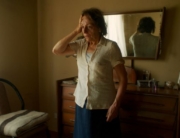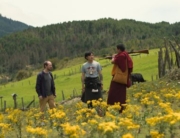Within the fraught boundaries between Palestine and Israel, director Sameh Zoabi punctures stereotypes on both sides of the security wall with the satirical Tel Aviv on Fire. The incendiary title plays with the one subject both sides have in common: the love of soap operas.
Tel Aviv on Fire is also the name of the series where Salam (Kais Nashik, best known for the serious Paradise Now) has just been kindly hired by the producer, his uncle Bassam (Nadim Sawalha). Commuting to work from East Jerusalem to the television studio in Ramallah, the Palestinian capital on the West Bank, Salam’s Hebrew skills are supposed to come in handy to oversee the Hebrew dialogue in the scripts. In the show’s telenovela-like plot, set just before the 1967 war, a Palestinian Mata Hari is played by a special guest star from France, Tala (Lubna Azabal of the dramatic Incendies). As a spy, she has been sent by her Palestinian “freedom fighter” lover to become the Israeli secretary for an Israeli colonel, Yehuda (Yousef Sweid), and seduce him for military information. The hook is: tune in each day to see if she falls for him or stays loyal to her people.
Salam starts interrupting filming with corrections that are not welcomed by all, so he decides to ask an Israeli soldier at a checkpoint if he was right about the use of the word “explosive,” only to get hustled away as a terrorist. He manages to convince the checkpoint commander, Assi (Yaniv Biton), that he is a writer for the program, which happens to be Assi’s wife’s favorite. But Assi wants proof, so he asks Salam to make changes in the next episode. Each following day Assi makes more and more (amusing) demands, particularly on the role of the Israeli soldier—while holding on to Salam’s passport as a guarantee.
While his uncle objects that some of the “Zionist propaganda” changes will annoy the show’s Arab financiers, Salam’s suggestions get him promoted from lowly production assistant to the writing staff. Now he has to learn how to write a script. Just as Assi is using his proven influence to impress his wife, Salam exploits his promotion to impress childhood friend Mariam (Maïsa Abd Elhadi), a nurse who discovers all of her patients are tuned in to the soap opera.
Even with the charged particulars of the setting, there is plenty of breezy, border-crossing humor, especially on the studio set, such as the lead actress behaving like a diva. (The script is co-written with Dan Kleinman, Zoabi’s screenwriting teacher at Columbia.) Certainly, soaps from Egypt to Mexico appear to have in common the exaggerated emotions and over-dramatized acting that are easy satirical tools, which match the somewhat buffoonish portrayals of the hummus-loving Israelis. And all worry if the show will get renewed.
Zoabi achieves his goal: films with Palestinians and Israelis together can be very funny.







Leave A Comment